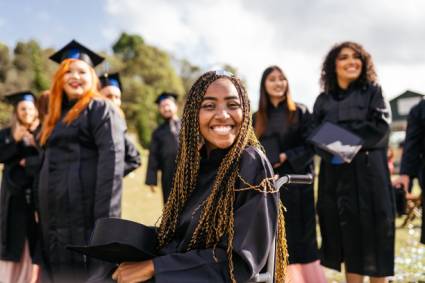Our Work
Youth with Disabilities in Action
Spreading the word about alternatives to guardianship

Participatory research and advocacy projects are helping youth with intellectual and developmental disabilities to speak up and explore alternatives to guardianship. Image from Microsoft PowerPoint 2023
I don’t have a guardian. That means I have a lot of responsibility but I feel I can take that on, little by little. At certain points in my life, I’ve had conversations about guardianship and alternatives., and I’m still having those conversations! When I was younger, my mother and I would talk about it in IEP meetings. Guardianship wasn’t presented to me suddenly in a kind of “sign this piece of paper and there you go” moment. But we wouldn’t go into depth about how everything actually plays out either. It came up little by little, with questions like, “Do you know what you want to do for your future?” and “Do you know where you want to live?”
I think a lot of people in these meetings dumbed it down for me because they didn’t think I could figure it out on my own, or they thought I wouldn’t be able to process it. But there’s a difference between dumbing something down and saying it plain language. Dumbing it down means you’re talking to someone like a kid. Explaining something in plain language means going into depth, but making sure you’re using words that people can understand.
And during these conversations, people in these meetings would focus more on my parents than on me. They would ask me to leave the room. In my head I thought, “Why would I leave the room? Isn’t this conversation about me and for me?” It made me angry. Now that I’m actually involved in research and advocacy on alternatives to guardianship, people actually want to hear what I have to say. Before, it was like a “hi and bye” sort of thing. Now, I don’t have to hold tongue back anymore. Now, people actually listen to me. Now, I’m in the driver’s seat.
I hadn’t dug deeply into this whole topic until I began researching it as part of the “GATOR” project, and now I have a much better understanding. “GATOR” stands for “Guardianship, Alternatives, and Transfer of Rights.” It’s a collaboration between the Institute for Community Inclusion at University of Massachusetts Boston (ICI), the Self-Advocacy Association of New York State (SANYS), and Massachusetts Advocates Standing Strong (MASS)—it’s a whole team effort. We focus on seeing what’s happening out there in conversations about when students with disabilities turn 18 years old. We’ve read a lot of literature on this topic and we’ve found that there’s not a lot of easy-to-understand information for students on this topic. That may be why some students like me are not as involved in the conversations about guardianship and alternatives as they could be.
Through GATOR, we’ve interviewed transition-age students with intellectual and developmental disabilities in New York and Massachusetts about the conversations they’ve had about turning 18 years old. Everyone has a different story to tell. Some people may have that conversation and some people may not have that conversation at all. Some people have conversations about what they want to do for the future, and they have someone to talk to about those things and help to break it down for them. Others, not so much.
Everybody thinks differently about how they want to make decisions as an adult. I think everybody interprets guardianship and alternatives differently and it depends on how they process that information (or lack of information). Even if, for example, some says to me that guardianship is “x, y, and z,” there are certain things that I’m not going to understand right away and they’re going to have to help me to learn about it. I’m not an encyclopedia, you know! Everybody’s learning process is different. And sometimes it’s not even talked about, which is something that we’re trying to change: some students may not know what their rights are or what they’re capable of doing because it’s not being talked about with them.
Aside from GATOR, I’ve also gotten involved in a project called “CYVYC” which stands for “Center for Youth Voice, Youth Choice.” It's a collaboration between ICI, the Center for Public Representation, Self Advocates Becoming Empowered, and the Human Services Research Institute. I’m on that project’s youth advisory board. Our ultimate goal is to let youth and young adults with intellectual and developmental disabilities know that they have the option to be their own person. Self-advocates teach youth how they can do that and who can help them, and they remind them that they’re not alone in this. These youth then become ambassadors, who help spread the word about alternatives to guardianship, so that other youth and the people around them can feel confident about exploring those options.
At the end of the day, for every young person with a disability, it’s important to speak your mind. There’s always a learning curve, but you’re going to be okay as long as you find your way to do it. Everybody does things differently and that’s okay. Not everybody can be the same person—that would be boring! Just be yourself and don’t let society tell you that you have to be in a box.
Kamisha Heriveaux is Self-Advocate Content Expert for Massachusetts Advocates Standing Strong.

